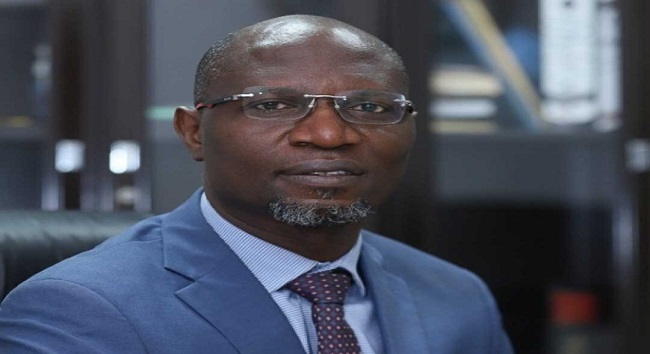News
Building Connections – The Value of Our Transport Networks

By Tobechukwu Okigbo
Over the years, embarking on road trips across Nigeria has provided me with some of the most fulfilling and memorable experiences of my life.

Tobechukwu Okigbo, Chief Corporate Services Officer of MTN Nigeria.
Our country is blessed with natural and beautiful landscapes, local cultures, languages and architecture that change as you move through the states or geo-political zones.
It’s only when you travel like this that you experience the richness of our diversity, providing a much-needed perspective and deeper understanding of our country.
When you can’t see a country for what it really is, then you are especially vulnerable to the manipulation of more radical elements.
Travelling through these places gives one a direct connection to them, and it is those connections that are so important to our cohesion.
Unfortunately, the option to travel by road is more limited today than it has been in the past, especially taking into consideration the prevailing security challenges.
Nigeria currently is quite low in the global ranking of road networks to people ratio, with many important roads in various state of disrepair.
This has an impact, not only on our individual ability to explore and understand our nation, building connections between us, but on our economy; limiting domestic trade, commerce and tourism, driving up costs and so reducing our competitiveness.

In turn, this impacts productivity, employment and puts a brake on improvements to living standards.
When a farmer struggles to get his produce to the market, the quality of the produce available to the consumer is lower and costs more.
When a petroleum marketer needs to move product from Lagos to Kano, the time it takes is a direct input into the price differentials we see across the country.
When it takes longer for a can of Coca-Cola to navigate the roads in the East, then it costs more for the consumer when it gets there.
When tourists fly into major cities but are unwilling to brave our roads and cannot explore our regions, we lose not just income, but the ability to share our culture and heritage with others.
At a very human level, poor roads contribute to unnecessary accidents and deaths.
The Federal Road Safety Corps (FRSC) estimates that 3,700 people lost their lives in the first ten months of 2022, and road quality is one of the top-ten causes of those accidents.
These challenges are not new, and the impact is understood by the government.
The Senate has estimated that Nigeria loses over N1 trillion in annual revenue due to bad roads, revenue which is critical to us as a nation.
The Federal Roads Management Agency (FERMA) estimates that the cost of loss in man-hours due to traffic caused by poor roads is N1.02 trillion every year.
This is before we consider the additional costs associated with price inflation that Nigerians and Nigerian businesses have to absorb.
Many will put the responsibility to fix roads solely on government. Besides, what are the governments at various levels doing if they cannot fix the roads.
Indeed, in fairness to the current administration, a lot of work has been done in both road repairs and the construction of new ones.
But the truth is, the expectations are very high. However, the reality is that the government alone cannot fix all the roads.
They only have to be strategic and take the lead on an integrated approach to providing motorable roads to the citizenry, which is why in recognition of the importance of improving our road infrastructure, the Nigerian government conceived and launched the Road Infrastructure Tax Credit (RITC) in 2019, a tax incentive programme to crowd in private sector finance for road construction, maintenance and repair.
It is designed to accelerate the investments that can be made to improve the network of roads in the country.
The government recognises the severity of the funding gap that exists, and that partnerships are required to deliver better roads, faster.
Not only does the RITC programme mobilise additional funding, it ensures that public budgets can be allocated to other equally pressing development priorities.
When done well, with proper planning, design and monitoring, these programmes attract significant private sector support and deliver impressive results.
Recognising that the RITC programme encapsulates everything that we at MTN call shared value, we are proud to have marked the 20th anniversary of our operation in Nigeria in 2021, by successfully bidding to reconstruct the 110km dual carriage Enugu-Onitsha expressway.
There is no better way of demonstrating the strength of the partnership between MTN and Nigeria, than by directly contributing to a project that benefits the government, business and the people by improving people’s ability to connect.
It is a tangible manifestation of our belief that “We’re good together” and an extension of our purpose to enable the benefits of a modern connected life to everyone.
MTN will invest N202.8 billion in the rehabilitation of the road, receiving tax credits of the equivalent value that it can use to offset future tax liabilities.
Work has already commenced on the road with a delivery schedule that anticipates people will be able to use it within 18 months.
We fully understand the strategic importance of the Enugu-Onitsha road to the eastern economy and Nigeria at large.
For us, the completion of the rehabilitation of the expressway is more than fixing a road. It is more than a road; it is connecting people and opening an economy.
It is about creating memories for people to appreciate the beauty of our land.
I am incredibly excited at the potential of this partnership to embed a culture of collaboration between the public and private sector in Nigeria.
It is not just MTN that recognises this opportunity. The strong design of the RITC is evidenced in the range of other private sector partners that are joining the programme.
By working together, we can accelerate progress towards national development goals, make life easier for Nigerians and improve the prospects for all businesses, large and small.
Personally, I look forward to driving on the Enugu-Onitsha expressway, to re-ignite my passion for road trips, and seeing the vibrant beauty that is Nigeria.
It is not just about fixing a road; it is about accelerating connectedness and building lasting partnerships.
We’re good together!
Okigbo is the Chief Corporate Services Officer of MTN Nigeria.
News
SEC Cracks Down on Influencers, Bloggers Promoting Fraudulent Investment Schemes

Securities and Exchange Commission (SEC) has issued a stern warning to social media influencers, bloggers, and celebrities, urging them to desist from promoting unregistered and fraudulent investment schemes. The warning was issued by the SEC’s Director-General, Dr Emomotimi Agama, in a notice released on Sunday in Abuja.

Dr Agama noted that the Commission is working in close collaboration with the Economic and Financial Crimes Commission (EFCC), the Nigeria Police Force, and other relevant government agencies to identify and prosecute those found guilty of flouting investment regulations.
Highlighting the provisions of the newly enacted Investments and Securities Act (ISA) 2025, Dr Agama said the law specifically targets the promoters of unregistered investment schemes, including individuals who use their platforms to endorse such ventures.
“The law also covers influencers and bloggers who promote fraudulent schemes, with clear penalties, including imprisonment,” he stated.
Citing the recent collapse of CBEX—a digital investment platform accused of defrauding Nigerians of over ₦1.3 trillion—Agama described the incident as a stark reminder of the dangers posed by unregulated financial platforms. CBEX allegedly promised unrealistic returns and falsely claimed international partnerships.
“The collapse of CBEX underscores the urgency of our crackdown. We are shutting down their operations, and the promoters will face the full weight of the law,” he added.
Agama reiterated the Commission’s resolve to protect investors and develop Nigeria’s capital market. He urged Nigerians to verify any investment opportunity with the SEC before committing their money, advising: “If it sounds too good to be true, it probably is.”
He also reassured the public of the SEC’s capability to detect and shut down Ponzi schemes, stating, “We have dealt with similar schemes in the past and will continue to do so, leveraging the powers of the ISA 2025 to safeguard investors.”
In a bid to strengthen regulatory oversight, the SEC has established dedicated departments tasked with monitoring market activities and conducting inspections aimed at detecting irregularities early.
“These proactive measures are designed to prevent large-scale frauds like CBEX from recurring,” Dr Agama said.
He concluded by emphasising the significance of the ISA 2025 as a critical tool in securing the Nigerian investment landscape and building a resilient and transparent financial market.
News
SERAP Files Lawsuit Against NBC Over Ban on Eedris Abdulkareem’s Protest Song Tell Your Papa

Socio-Economic Rights and Accountability Project (SERAP) has filed a lawsuit against the National Broadcasting Commission (NBC) over its ban on Eedris Abdulkareem’s song Tell Your Papa, which allegedly criticizes President Bola Tinubu’s economic policies.

The NBC prohibited the song from being aired on radio and television, citing its “objectionable nature” and violation of “public decency standards.” SERAP, however, argues that the ban is arbitrary, illegal, and unconstitutional.
In the suit numbered FHC/L/CS/797/2025 filed at the Federal High Court in Lagos, SERAP is seeking an order to nullify the ban, describing it as inconsistent with the rights to freedom of expression, access to information, and media freedom. The group is also requesting a perpetual injunction to prevent NBC or any other authority from barring the song from being aired on broadcast platforms across Nigeria.
According to SERAP, the NBC’s April 9 directive to all broadcast stations banning the song is unlawful and incompatible with constitutional and international human rights standards. The organization states that censorship under the guise of “protecting public decency” cannot justify suppressing dissent or political commentary.
SERAP emphasizes that freedom of expression includes not only agreeable ideas but also those that challenge, shock, or disturb. It argues the ban has a chilling effect on artistic freedom and public discourse, noting that the NBC has not demonstrated any specific harm that the song might cause to legitimate state interests.
The group also challenges Section 3.1.8 of the Nigeria Broadcasting Code, describing it as overbroad and excessively intrusive. It argues that vague standards like “objectionable content” and “public decency” should not serve as pretexts for suppressing music critical of government policies.
Filed on behalf of SERAP by lawyers Kolawole Oluwadare, Oluwakemi Agunbiade, and Valentina Adegoke, the suit insists that all individuals have the right to freedom of expression and artistic creativity. The ban, they argue, fails to meet legal standards of necessity and proportionality.
Art, SERAP notes, plays a vital role in democratic societies by fostering dialogue, counter-narratives, and reflection on societal issues. Suppressing such expression stifles debate and undermines democracy.
The organization maintains that NBC’s action violates Section 39 of the 1999 Constitution, Article 9 of the African Charter on Human and Peoples’ Rights, and Article 19 of the International Covenant on Civil and Political Rights (ICCPR), to which Nigeria is a signatory.
Article 19 of the ICCPR protects the right to freedom of expression, including the freedom to seek, receive, and impart information and ideas in any form, including art. SERAP warns that unjustified censorship not only harms artists but also weakens public engagement, artistic livelihoods, and democratic culture.
News
Airtel Smartcash Set to Power Stress-Free Easter with Seamless Cashflow

As Nigerians prepare to celebrate Easter with loved ones across the country, leading mobile money operator Smartcash Payment Service Bank (PSB) has announced an easier system by which customers may upgrade their wallets from Tier 1 to Tier 3 for a smooth, cashless, and stress-free holiday experience.

Offering improved security, access, and reliability, the Smartcash app now enables instant verification with customers’ NIN or BVN, secure facial recognition with a selfie, and simplified address confirmation.
Upgrading from Tier 1 wallet provides higher transaction limits and access to more features and benefits as well as security.
According to the Chief Executive Officer of Smartcash PSB, Tunde Kuponiyi, Smartcash is concerned with ensuring a stress-free experience for customers.
“As the Easter season approaches, we recognize the financial pressure and logistical challenges that often come with holiday spending and mobility. That’s why we’re committed to ensuring that our users can carry out essential transactions from bank transfers to merchant payments quickly, safely, and conveniently.
“Our goal is to eliminate the stress of cash handling, long queues, and bank branch visits, so that Nigerians can truly focus on the spirit of the season connection, community, and celebration,” he said.
Smartcash PSB is providing a reliable, cashless alternative that meets the financial needs of users wherever they are. Whether it’s sending money to loved ones, paying at local markets and stores, or topping up airtime and data, Smartcash users can look forward to uninterrupted and efficient services throughout the holiday season.
Airtel Smartcash PSB, which launched as part of Airtel’s commitment to deepen financial inclusion, has rapidly expanded its network of agents and digital wallet users, bridging access between underserved communities and the financial system.
With services available through mobile phones and human agents across Nigeria, Smartcash offers a simple and accessible entry point into the digital economy particularly for small-scale traders, artisans, rural dwellers, and other players in the informal sector.

 Telecom1 day ago
Telecom1 day agoMTN Nigeria Takes Broadband Services to the Next Level with FibreX Launch

 News1 day ago
News1 day agoSERAP Files Lawsuit Against NBC Over Ban on Eedris Abdulkareem’s Protest Song Tell Your Papa

 E-Financial1 day ago
E-Financial1 day agoFCMB Group Redefines Corporate Storytelling with The Power Of The Group TVC

 General News4 hours ago
General News4 hours agoEFCC Clarifies SCUML Certificate Misuse Amid CBEX Ponzi Scheme Scandal

 E-Financial4 hours ago
E-Financial4 hours agoCBN, NGX Group Defend Economic Reforms at Nasdaq

 Telecom4 hours ago
Telecom4 hours agoDigital Transformation Remains Africa’s Gateway to Economic Advancement – Adumike

 Telecom4 hours ago
Telecom4 hours agoPAFON 2.0: Experts Discuss Pathways to Boost Financial Inclusion in Nigeria

 E-Business4 hours ago
E-Business4 hours agoGold Hits Record High Amid U.S. Dollar Weakness and Trade Tensions























